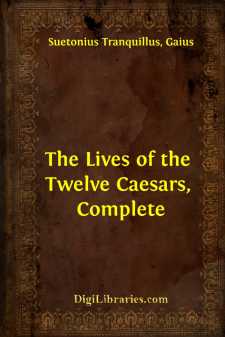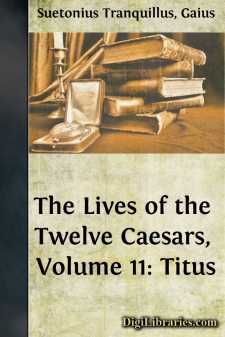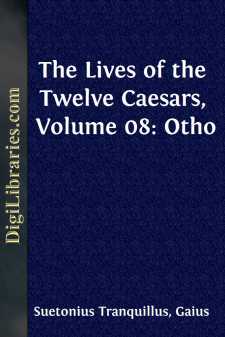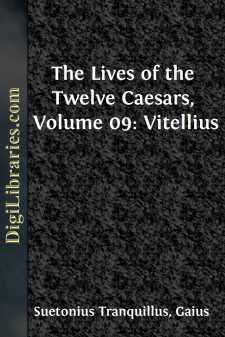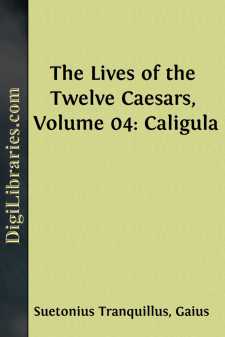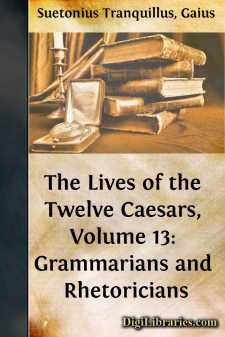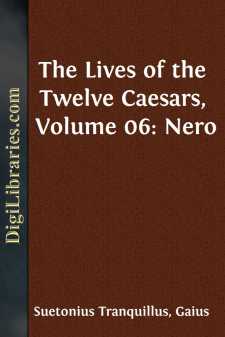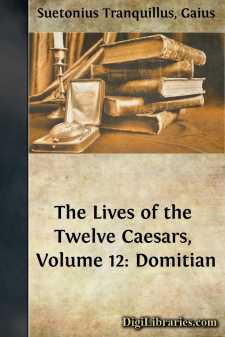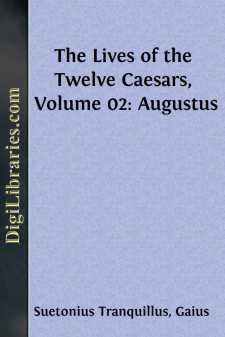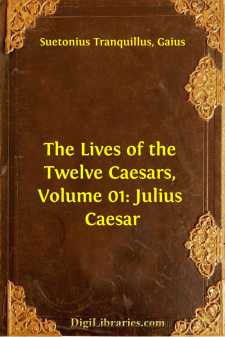Categories
- Antiques & Collectibles 13
- Architecture 36
- Art 48
- Bibles 22
- Biography & Autobiography 813
- Body, Mind & Spirit 142
- Business & Economics 28
- Children's Books 16
- Children's Fiction 13
- Computers 4
- Cooking 94
- Crafts & Hobbies 4
- Drama 346
- Education 46
- Family & Relationships 57
- Fiction 11829
- Games 19
- Gardening 17
- Health & Fitness 34
- History 1377
- House & Home 1
- Humor 147
- Juvenile Fiction 1873
- Juvenile Nonfiction 202
- Language Arts & Disciplines 88
- Law 16
- Literary Collections 686
- Literary Criticism 179
- Mathematics 13
- Medical 41
- Music 40
- Nature 179
- Non-Classifiable 1768
- Performing Arts 7
- Periodicals 1453
- Philosophy 64
- Photography 2
- Poetry 896
- Political Science 203
- Psychology 42
- Reference 154
- Religion 513
- Science 126
- Self-Help 84
- Social Science 81
- Sports & Recreation 34
- Study Aids 3
- Technology & Engineering 59
- Transportation 23
- Travel 463
- True Crime 29
The Lives of the Twelve Caesars, Complete
Description:
Excerpt
C. Suetonius Tranquillus was the son of a Roman knight who commanded a legion, on the side of Otho, at the battle which decided the fate of the empire in favour of Vitellius. From incidental notices in the following History, we learn that he was born towards the close of the reign of Vespasian, who died in the year 79 of the Christian era. He lived till the time of Hadrian, under whose administration he filled the office of secretary; until, with several others, he was dismissed for presuming on familiarities with the empress Sabina, of which we have no further account than that they were unbecoming his position in the imperial court. How long he survived this disgrace, which appears to have befallen him in the year 121, we are not informed; but we find that the leisure afforded him by his retirement, was employed in the composition of numerous works, of which the only portions now extant are collected in the present volume.
Several of the younger Pliny's letters are addressed to Suetonius, with whom he lived in the closest friendship. They afford some brief, but generally pleasant, glimpses of his habits and career; and in a letter, in which Pliny makes application on behalf of his friend to the emperor Trajan, for a mark of favour, he speaks of him as "a most excellent, honourable, and learned man, whom he had the pleasure of entertaining under his own roof, and with whom the nearer he was brought into communion, the more he loved him."
The plan adopted by Suetonius in his Lives of the Twelve Caesars, led him to be more diffuse on their personal conduct and habits than on public events. He writes Memoirs rather than History. He neither dwells on the civil wars which sealed the fall of the Republic, nor on the military expeditions which extended the frontiers of the empire; nor does he attempt to develop the causes of the great political changes which marked the period of which he treats.
When we stop to gaze in a museum or gallery on the antique busts of the Caesars, we perhaps endeavour to trace in their sculptured physiognomy the characteristics of those princes, who, for good or evil, were in their times masters of the destinies of a large portion of the human race. The pages of Suetonius will amply gratify this natural curiosity. In them we find a series of individual portraits sketched to the life, with perfect truth and rigorous impartiality. La Harpe remarks of Suetonius, "He is scrupulously exact, and strictly methodical. He omits nothing which concerns the person whose life he is writing; he relates everything, but paints nothing. His work is, in some sense, a collection of anecdotes, but it is very curious to read and consult."
Combining as it does amusement and information, Suetonius's "Lives of the Caesars" was held in such estimation, that, so soon after the invention of printing as the year 1500, no fewer than eighteen editions had been published, and nearly one hundred have since been added to the number. Critics of the highest rank have devoted themselves to the task of correcting and commenting on the text, and the work has been translated into most European languages. Of the English translations, that of Dr. Alexander Thomson, published in 1796, has been made the basis of the present. He informs us in his Preface, that a version of Suetonius was with him only a secondary object, his principal design being to form a just estimate of Roman literature, and to elucidate the state of government, and the manners of the times; for which the work of Suetonius seemed a fitting vehicle. Dr. Thomson's remarks appended to each successive reign, are reprinted nearly verbatim in the present edition. His translation, however, was very diffuse, and retained most of the inaccuracies of that of Clarke, on which it was founded; considerable care therefore has been bestowed in correcting it, with the view of producing, as far as possible, a literal and faithful version....


